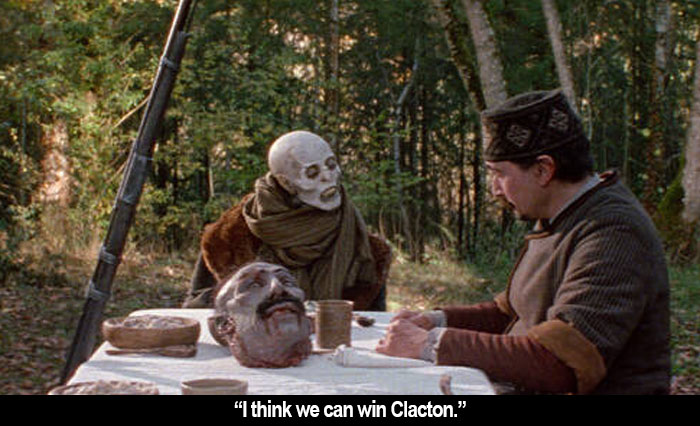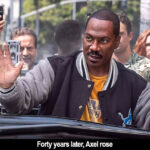Le Vourdalak
***½/****
starring Kacey Mottet Klein, Ariane Labed, Grégoire Colin, Vassili Schneider
written by Adrien Beau and Hadrien Bouvier, based on the story “La famille du Vourdalak” by Aleksei Tolstoy
directed by Adrien Beau
by Walter Chaw Adrien Beau’s The Vourdalak has the look and feel of all those period horrors from the heyday of AIP and Hammer and the early years of Amicus. There’s even a touch of Jean Rollin, who brought production value and class of a sort to eroticized genre fare. It also features my favourite horror scenario: a lost traveller landing on the doorstep of a mysterious manse in the middle of a haunted wood. In films that start like this, sometimes it’s during a storm, sometimes the moon is new and the night’s so black the traveller can’t see his hand in front of his eyes. Sometimes, he is the monster, though more often, the traveller finds himself in the company of monsters. In Valeri Rubinchik’s The Savage Hunt of King Stakh, maybe the pinnacle of movies that open this way, our wayward traveller is bewitched by the sight of a beautiful woman, the lady of the manor, who haunts the decrepit, cavernous expanse like the rumour of a draft. In The Vourdalak, the traveller is prim Marquis Jacques Antoine Saturnin d’Urfé (Kacey Mottet Klein), a member of the King’s court who has been separated from his companions by bandits. The family of Gorcha, a great man currently away on a mission of vengeance against the marauding Turks who ransacked this part of the world, takes him in. Gorcha has warned his sons and daughters (and daughter-in-law) not to let him, Gorcha, back in the house should his absence stretch longer than six days. Because if he comes back after that, he says, it will be as the Vourdalak.
The Vourdalak has a feeling of uncanniness about it, heightened by the escalating absurdity of the situation and by the audacious stylistic decisions to shoot in 16mm and have a marionette (sculpted, manipulated, and voiced by director Beau) play the title character. It feels like a Jim Henson production, one of the weird ones like Dreamchild, perhaps, if the portrayed author was Aleksey Nikolayevich Tolstoy (upon whose short story this film is based) rather than Lewis Carroll. And, of course, if the Muppet interacting with the human actors had a taste for human blood. The creature itself is something of a shapeshifting vampire who feeds primarily on the blood of his loved ones. This is an important point, because the Marquis is not a member of the family. If the Vourdalak turns its attentions on him, then it speaks to an essential shift in the lore…or to a twist that’s too interesting to ignore.
Sdenka (Ariane Labed), the wife of son Jegor (Grégoire Colin), is the ostensible object of the Marquis’s attention. In her severity and independence, she expresses to their guest her dissatisfaction with her modest lot in life and a desire to see and experience the world beyond her family’s cloistered walls. Besides, she’s never gotten the hang of cooking and other hallmarks of domesticity. The Marquis seeks to seduce her away, but his powers of seduction are flailing and awkward. A lot of The Vourdalak is country mouse/city mouse farce, charming and light. Early in the film, the Marquis mistakes the son, Piotr (Vassili Schneider), for a young woman, dressed as he is in a woman’s smock with makeup and earrings. It’s the first hint the film might have sexual orientation on its mind. When the Marquis later returns one of Piotr’s misplaced earrings–after telling him, obliquely, that one of the tragedies of losing a beloved pet is the absence of a creature able to see them as they truly are–the film becomes a shockingly poignant rumination on the various traps awaiting those who are femininely coded in a violent patriarchy.
I love the first meal upon Gorcha’s return, where everyone’s doing their best not to let on that their father is now a six-foot-tall marionette. Gorcha boasts of his fighting prowess, complains about the dog’s barking, and plops his Turkish foe’s severed head wetly on the table. He apologizes for the country coarseness of his family to the astonished Marquis, a gesture I took as contemptuous rather than genuine (although it’s a little hard to tell on a carved puppet’s minimally articulated face), and takes his leave, citing fatigue while licking his lips at the prospect of a night spent hunting his progeny. The rest proceeds as one would expect, with Beau shooting it all in expressionistic tableaux that abstract the horrors into macabre art installations; the film has the air of a waking nightmare or a hallucination. Compare it to Mario Bava’s adaptation of the story in the third segment of Black Sabbath, in which a game and wonderfully manic Boris Karloff, starring as the ghoul, stalks his family through a large set bathed in harsh shadows and Bava’s typically lurid colours. In Beau’s film, the Marquis has his chance to get away but returns to rescue Sdenka, provided she will consent to be rescued–only to discover that, more than willing, she wants to consummate their illicit affair before they go.
I’m about to spoil the film, so stop reading here if you’re sensitive to that. The sex scene is relatively explicit and undeniably romantic–and then, spotting his reflection in their surroundings, the Marquis realizes he’s thrusting into the Vourdalak. He pulls away, his neck gaping from the Vourdalak’s feasting, and the monster, in its ecstasy, confesses to the Marquis that things for Gorcha might have been different had the Marquis stumbled into his family’s life earlier. That’s–what’s the term for it? Gobsmacking. The Vourdalak is a shrine to an entire history of genre films that understands the homoerotic subtext in so many of these tales of men fearing women’s sexuality, arm-in-arm with their brothers and often at odds with the handsome monsters they become unnaturally obsessed with. The Vourdalak is not only an example, it’s a critique. And it’s not only a critique, it’s an emotional expansion of decades of LGBTQ subtext in genre. I love this film, and can’t wait to see what Beau does next.




![The Rocky Horror Picture Show (1975) + Shock Treatment (1981) [Bodice-Ripping Fabulous 3-Disc Set] - DVD 6a0168ea36d6b2970c017ee3d3e4d7970d](https://filmfreakcentral.net/wp-content/uploads/6a0168ea36d6b2970c017ee3d3e4d7970d.jpg)


